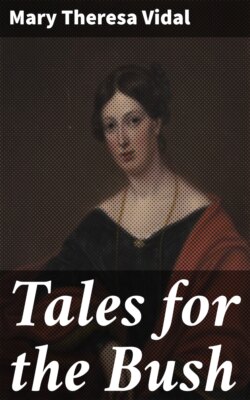Читать книгу Tales for the Bush - Mary Theresa Vidal - Страница 12
CHAPTER I.
ОглавлениеHANNAH AND ANNE SANDFORD were the daughters of a small settler in this country. Their brother David, who was fourteen years old, assisted his father in the farm. Hannah was twelve and Anne eleven. They were old enough to be useful at home, in minding the younger children, or attending to the dairy and pigs; but their parents were good kind of people, and were willing to sacrifice this for the sake of their attending the Church School. John Sandford, the father, had given his portion towards building the School-house, and he felt interested in it; and on a Sunday morning he sometimes walked down and heard Mr. Neville the clergyman catechise the children, and explain the Epistle and Gospel for the day. He was a plain, honest man; he had not grown quite so rich as many others, but that was because he could never find it in his heart to ask more than the right value for an article: he was no great hand at making a bargain. He worked hard all the week; but on Saturday night he laid aside work, and anxious thoughts about his crops and cattle, just as he laid aside his working-clothes; and on Sunday, Sandford came out in his coat and white trowsers, and a heart that felt glad and at peace. He was always to be seen in his accustomed corner in church, and his conduct while there was very different from some others, who seemed to come only to look about them during the prayers; and then, if the sermon chanced to hit their fancy, listen to it as a matter of curiosity.
Sandford often wished that he could persuade his wife to accompany him, or he offered to take it by turns to stay at home and let her come. But Anne Sandford was one of those busy, bustling, thrifty women, who give themselves no time for thought; she said that it "was impossible for her to go to church." She thought her whole duty consisted in making the most of everything, keeping her house clean, and everything polished and bright. She often blamed her husband for neglecting to turn a penny when he might have done so. And very proud was she of the sum her butter and eggs and poultry brought her in.
Now all this was praiseworthy and right. It is right to be saving and thrifty, and neat and clean, and, for many persons, it is right to work hard and have little time for quiet; but it is not right to set our hearts upon these things--it is very dangerous to do so.
The cares of this world are apt to choke the good seed which was planted in our hearts at Baptism, just in the same way as weeds in our garden destroy the seed we have put into the ground. We ought to try to balance our duties, that is, not to be so intent upon being neat and thrifty, as to forget the other duty of prayer and thoughts of God; nor to be so fond of thinking and being quiet, as to make us forget our daily duties and to be active and industrious.
Those who have the care of a family and farm upon them have necessarily much to do. Their appointed task is to be industrious and active; they have not so much time for reading the Bible and thinking, as single persons--or old people, or those who by weak health are shut out from hard work. But let them beware of making the world their idol--of forgetting God.
One day in every seven is mercifully set apart for the benefit of all. Every one may, on the Lord's day, go to church, and leave off from the busy duties of the week.
What did our Saviour say to Martha? She was cumbered about much serving; she was desirous to have everything neat and nice for her Divine Master: it was her duty, as mistress of the house, to attend to these things. But our Lord knew the danger of it, and he said to her kindly, but in a warning manner, "Martha, Martha, thou art careful and troubled about many things; but one thing is needful."
